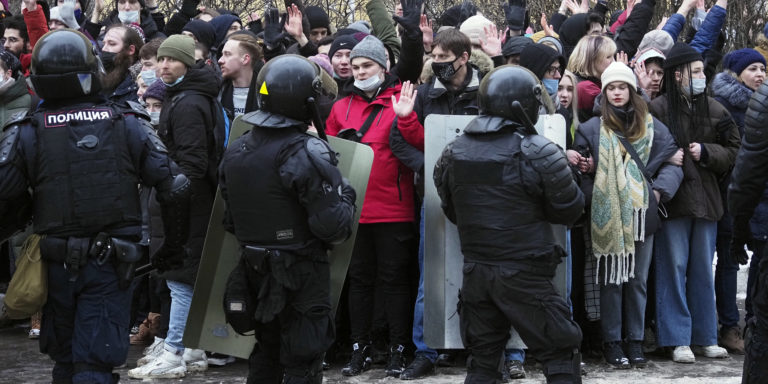INTELBRIEF
February 10, 2021
IntelBrief: Can Navalny’s Supporters Sustain Momentum for Change in Russia?

Bottom Line Up Front
- By returning to Russia despite imminent arrest, Alexey Navalny hoped to inspire Russians to reclaim the country from decades of authoritarian rule.
- By design, there is no political opposition to Putin’s rule, with any challenge to Russia’s current leadership stamped out through coercive force.
- Despite growing tensions between the EU and Russia, Moscow still retains important leverage, notably in the form of the Nord Stream 2 pipeline.
- In a letter from jail after his sentencing, Navalny wrote: “The iron doors slam shut behind me with a deafening clang, but I feel like a free man.”
Following the arrest of Alexey Navalny on January 17, 2021, large-scale protests swept throughout Russia, from Saint Petersburg to Moscow. Navalny displayed unspeakable bravery and selflessness in returning to Russia to challenge Vladimir Putin, knowing he would be arrested. Navalny had barely survived an assassination attempt in August 2020 by a squad of assassins from Russia’s Federal Security Service (FSB) using the deadly poison Novichok. After recovering in Germany, he decided to return to Russia, fully aware of the fate that awaited him. However, by returning in the face of imminent arrest and years to the austere conditions of a Russian prison, Navalny sought to inspire a protest movement for Russians to challenge authoritarian rule. As expected, Navalny was arrested as soon as he landed, and a Moscow court then sentenced him to serve two and a half years in a penal colony. The Kafka-esque argument was that Navalny, essentially on probation with a three-and-a-half-years suspended sentence, missed appointments with his probation officer – never mind that he missed the appointments because he was recovering from an assassination attempt widely believed to be orchestrated by the Kremlin.
Thousands were arrested and detained across the country as Russians poured into the streets in what was a visceral repudiation of government corruption and Putin’s rule. Russian police and security services responded with aggressive force, using tear gas and stun devices to subdue civilians. Despite the momentum these protests generated, it nonetheless remains unlikely that they will lead to political change in the near term. By design, there is no political opposition to Putin’s rule, with any challenge to Russia’s dictator stamped out through coercive force and the power of a state apparatus accountable only to the leadership. A lull in organized protests is anticipated until the spring, giving time for the weather to warm and protesters to determine what comes next in a country where there has been no “next” for nearly two decades; protest without change suits the leadership in allowing for some release valves for public frustrations while a predatory elite benefits from the vulnerabilities of the state.
Despite growing tensions between the EU and Russia, Moscow still retains important international leverage, notably in the form of the Nord Stream 2 pipeline project, through which Russia supplies natural gas to Germany, upending the current pipeline routing through Ukraine. The United States and others object to Nord Stream 2, claiming that it will further strengthen Putin’s stranglehold over energy supplies to Europe. Others object to yet another massive carbon-based energy initiative. Armin Laschet, the newly-elected leader of Germany’s Christian Democrats and expected replacement for long-serving Chancellor Angela Merkel, has openly said he sees no reason why the project should not go forward, saying “feel-good moralizing and domestic slogans are not foreign policy.”
Navalny has garnered intense international attention far above his domestic base of support, angering the Kremlin. On February 5th, Russia expelled diplomats from Sweden, Poland, and Germany. The Russian Foreign Ministry said that the diplomats had participated in the “illegal demonstrations” on January 23rd. The expulsion was timed to coincide with a meeting between Russian Foreign Minister Sergei Lavrov and European Union Minister for Foreign Affairs Josep Borrell. On February 8th, the EU, U.S., and UK discussed how to respond to these latest expulsions. Borrell said the actions confirmed that “Europe and Russia were drifting apart.” In a letter from jail after his sentencing, Navalny wrote, “The iron doors slam shut behind me with a deafening clang, but I feel like a free man.” The Biden administration has voiced support for Navalny and spoken out against his jailing, but rhetorical support will only go so far. Washington still needs to determine how best to advance U.S. interests, including promoting democracy at home and abroad, and how this broader strategy impacts foreign policy toward Russia. Moreover, Russia is an important player on a number of security issues, including the conflict in Syria, where some kind of partnership will be necessary to affect a semblance of stability. While the Biden administration has signaled a willingness to cooperate on some joint priorities, such as on joint arms reductions, it has also stressed from the outset that Russia will not enjoy the same protections it did during the previous U.S. administration. However, there is little unity in the U.S. on how to manage relations with Putin, and the EU is similarly conflicted. Just as Navalny supporters are trying to figure out “what next?”, so should the West.